How Much Are Shots for a Puppy? (USA and UK 2024)
When we bring home a new puppy, taking care of their health and well-being becomes our highest priority, as it should. This new addition to your family unit needs a lot of care and attention, especially in the first few months — and this includes regular vet visits and vaccinations.
Every responsible pet owner knows that vaccinations are crucial for their furry friend’s health and well-being. If you, too, are the proud owner of a new puppy and are wondering how much are shots for a puppy, you’re not alone!
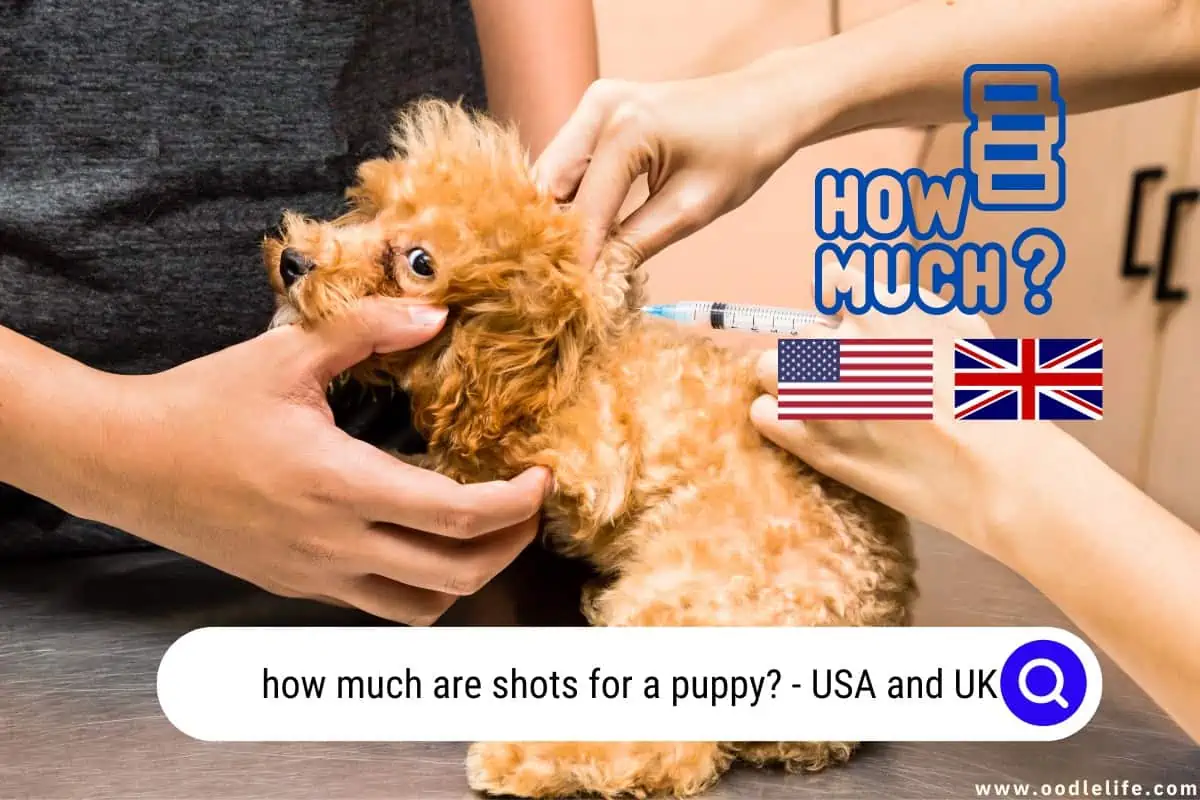
In this article, we’ll explore the cost of puppy shots in the USA and the UK in 2023. We’ll also discuss why budgeting for vaccinations is crucial for responsible pet ownership and offer tips to help you save money while keeping your canine friend healthy!
Cost of Puppy Shots in the USA
In the United States, the cost of vaccinating a puppy can vary depending on various factors, such as the location, the type of vaccine, and the veterinarian. The two main types of vaccines to consider are core vaccines and non-core vaccines.
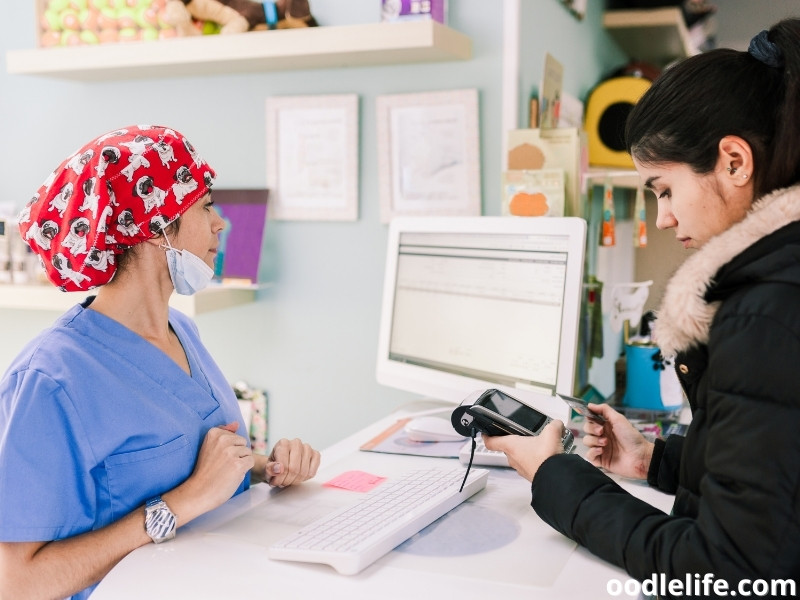
Core Vaccines
Core vaccines are essential for all puppies. They offer protection against diseases that can be life-threatening or highly contagious, such as distemper, parvovirus, hepatitis, and rabies.
On average, core vaccines for puppies can cost between $70 and $100 for each vaccine.
Non-Core Vaccines
Non-core vaccines are only necessary for certain puppies depending on their lifestyle, exposure to certain environments, and breed. These include vaccines for leptospirosis, Lyme disease, and Bordetella.
It’s important to note that while non-core vaccines are not required, they can still be essential for preventing diseases that can be costly to treat or lead to serious complications.
Non-core vaccines are slightly more expensive than core vaccines. The cost of these vaccines can vary but typically range from $25 to $50 per vaccine.
Additional Costs to Consider
Aside from the cost of the vaccines themselves, you also have to take into account some additional fees, such as an examination fee, consultation fee, and administration fee. These fees can range from $50 to $100 each.
However, some veterinarians may offer package deals that include all the necessary vaccines and fees for a reduced price.
Cost of Puppy Shots in the UK
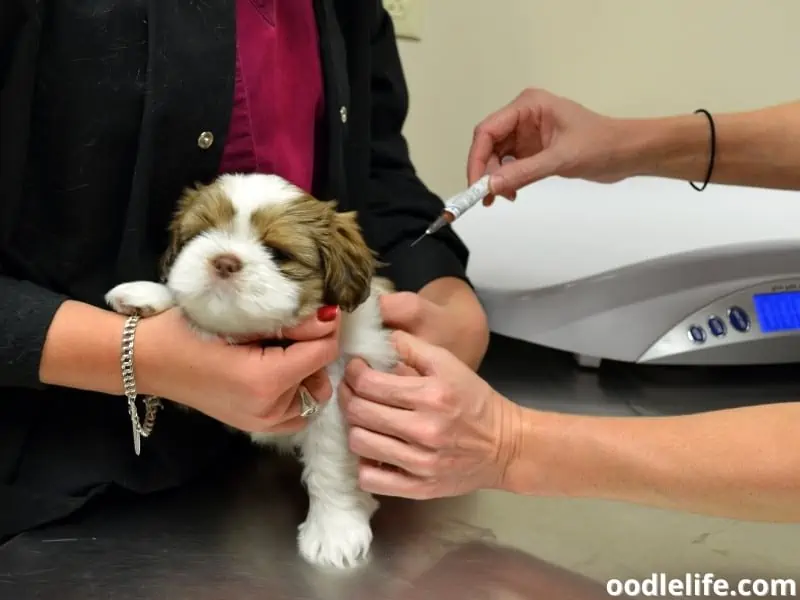
Core Vaccines
As mentioned, core vaccines are necessary for all puppies, and these include the vaccines against distemper, parvovirus, and adenovirus. The average cost of core vaccines for puppies in the UK is around £50-£80 per vaccine.
It’s important to note that this cost may vary depending on the region, veterinary clinic, and the specific vaccine brand used.
Non-Core Vaccines
Non-core vaccines are typically recommended for puppies based on their lifestyle and risk of exposure. These vaccines include leptospirosis, kennel cough, and rabies.
The cost of non-core vaccines may vary, but the average cost in the UK is around £25-£50 per vaccine.
Additional Costs to Consider
Just like in the US, there are some additional costs to consider when budgeting for puppy vaccinations in the UK, too. These costs may include the examination fee, consultation fee, and any other diagnostic tests or procedures that your puppy may need before or after the vaccination.
It’s best to inquire about these fees beforehand to avoid any surprises.
Tips for Saving Money on Puppy Vaccinations
Puppy vaccinations can be expensive, but you can still save money without compromising your pet’s health.

Here are some tips to help you save money on puppy vaccinations both in the US and the UK:
1. Research Veterinary Clinics
The first thing you can do is shop around for veterinary clinics or veterinarians who offer competitive pricing on puppy vaccinations. Many clinics offer promotions or discounts on puppy vaccinations, especially for first-time customers.
You can also check for online reviews and recommendations from other pet owners.
2. Consider Pet Insurance
Pet insurance can come with a monthly premium and may help you cover the cost of your puppy’s routine vaccinations as well as other veterinary expenses. This can potentially end up saving you money in the long run.
Make sure to read the terms and conditions of the policy carefully before signing up.
3. Bundle Vaccines
Some veterinary clinics offer bundle packages for puppy vaccinations, which can help you save money in the long run. These packages include multiple vaccines for a reduced price.
Make sure you ask your vet about this option as it can be more cost-effective than purchasing each vaccine individually.
4. Ask About Discounts
Don’t be afraid to ask your veterinary clinic if they offer any discounts for multiple pets or senior citizens.
5. Plan Ahead
Schedule your puppy’s vaccinations ahead of time and stick to the recommended vaccination schedule to avoid any unnecessary costs or delays.
Importance of Puppy Shots
Puppies are endearing, charming, and perceptive creatures who bring a lot of joy and happiness in their paw-rents’ lives. But like human newborns, they also need vaccinations to protect them from serious infections.
Let’s take a closer look at the importance of puppy shots and the benefits of vaccination, and the risks of not vaccinating:
Early Vaccination and Booster Shots
Early vaccination is critical for protecting puppies from numerous diseases. While they are born with some immunity from their mothers, their immunity wears off within the first few weeks of life.
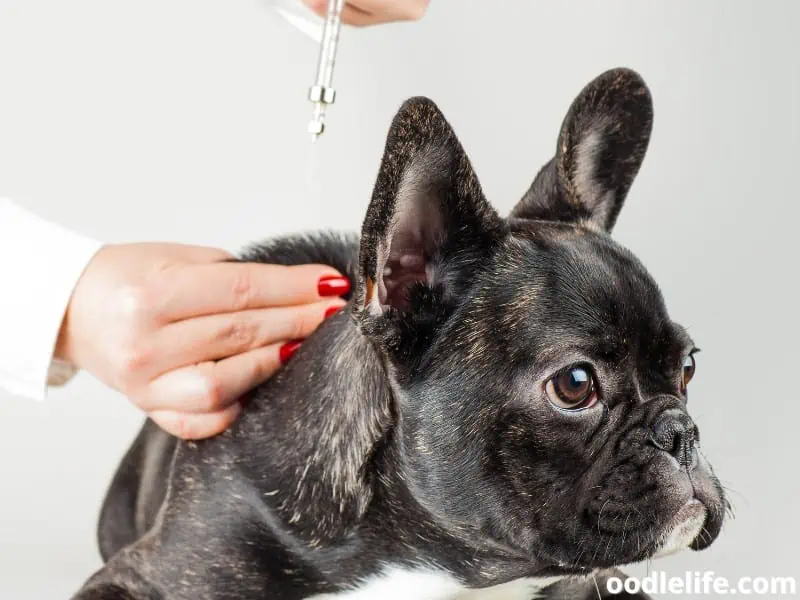
That’s why it’s recommended to start puppy shots when they are around six to eight weeks old and continue with booster shots every few weeks until they’re about 16 weeks old.
Booster shots are also important to maintain immunity as the puppy grows up and is exposed to new environments and potential diseases.
Benefits of Vaccinating Puppies
Vaccinating your puppy not only protects them against diseases but also minimizes disease transmission to other animals and even humans. This is especially true for infections like rabies or distemper, which can not only have long-term effects but can even be fatal. So, by sticking to a vaccination schedule, you are also helping the greater community curb the spread of deadly diseases.

Moreover, vaccines are often less expensive than treating illnesses that could have been prevented with proper vaccination. A single vaccination may spare you hundreds or even thousands of dollars in veterinary expenses, not to mention the distress of seeing your cherished dog struggle with a disease that could have been avoided.
Risks Associated with Not Vaccinating Puppies
The repercussions of not vaccinating your dog can be dire.

Here are a few potential consequences that may push you to be diligent with your pup’s vaccinations:
1. Your puppy may contract a deadly disease.
Unvaccinated puppies are more susceptible to a variety of severe infections, including distemper, parvovirus, hepatitis, and rabies. These diseases may cause excruciating pain and suffering to your pet and may even result in death. The expense of treating these diseases can also be incredibly expensive.
2. Your puppy can spread diseases.
Unvaccinated puppies can spread illnesses to other dogs and animals as well as to humans. This is especially concerning for people who have weakened immune systems or for other vulnerable animals who may not have received their vaccinations.
3. Your puppy may not be able to participate in certain activities.
If you plan to take your puppy to dog parks, training classes, or other public areas, some organizations require proof of vaccinations. Without them, your pup may not be allowed to participate, which can limit their socialization and exposure to new experiences.
4. Your puppy may need to be quarantined.
If your unvaccinated puppy is exposed to a disease, it may need to be quarantined for several weeks. This can be stressful for both you and your pup and can also be expensive.
5. You may be putting yourself at risk.
Some diseases that puppies can contract, such as rabies, can be transmitted to humans. If your unvaccinated puppy contracts one of these diseases, it may even put you at risk of getting sick.
Common Diseases that Puppies are Vaccinated Against
Puppies are particularly susceptible to a wide range of infectious diseases, some of which are fatal.

The following are some of the most common diseases against which they are vaccinated:
1. Distemper
Distemper is a highly contagious viral infection that can harm your dog’s respiratory, digestive, and neurological systems. Common symptoms include coughing, fever, diarrhea, and even convulsions. While the disease is typically fatal, those who survive may have long-term health complications.
2. Parvovirus
This is another extremely contagious virus that affects a puppy’s digestive tract, causing symptoms like vomiting, diarrhea, and dehydration. It can be fatal if not treated quickly, thus vaccination is necessary to protect your pet from this potentially fatal illness.
3. Hepatitis
Hepatitis is a viral condition that causes fever, vomiting, and weight loss in dogs. In extreme cases, it can cause liver damage and even death.
4. Rabies
Rabies is a viral illness that can destroy the nervous system of dogs, and if left untreated, it can have serious consequences for both humans and animals. Vaccination is essential if you plan on traveling with your pup or are living in an area where rabies is prevalent.
5. Adenovirus
Another viral illness that can cause serious infections in puppies is adenovirus, which affects both their respiratory and urinary systems. Coughing, sneezing, nasal discharge, and fever are all common symptoms. It can also cause pneumonia or hepatitis in severe cases.
This is a highly infectious disease that can swiftly spread among puppies who haven’t been immunized properly.
It’s important to note that adenovirus comes in two variants — type 1 and type 2. The core vaccination contains adenovirus type 1 and protects against both types 1 and 2. Although type 2 adenovirus is seldom lethal in dogs, it can cause respiratory infections.
As a result, vaccination against type 1 adenovirus is critical for disease prevention.
FAQs
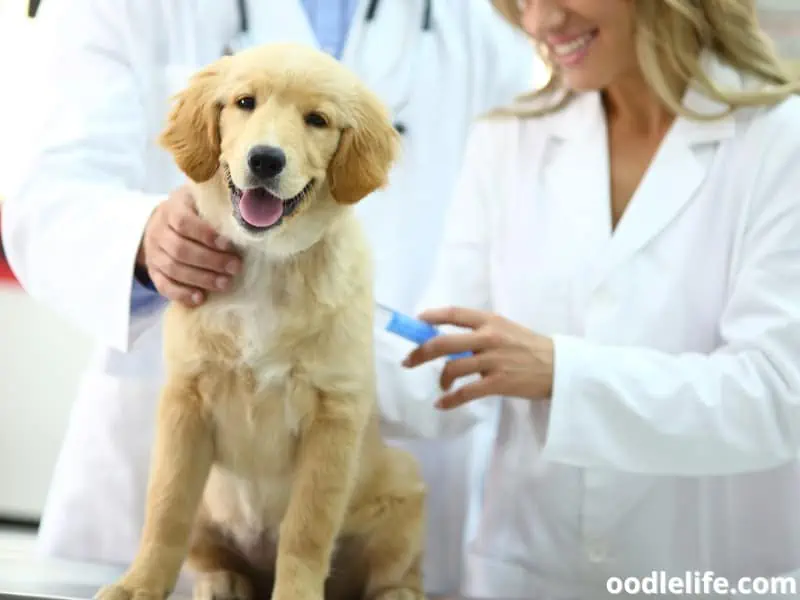
Do I need to get my puppy vaccinated if they are mostly indoors?
Yes! Even if your puppy spends most of its time indoors, it can still be exposed to diseases through contact with other animals, people, or even contaminated surfaces. It’s always better to be safe than sorry, so make sure to schedule vaccinations for your puppy.
Can my puppy get vaccinated if they are sick?
It depends on the severity of the illness. If your puppy has a minor illness, such as a cold or mild fever, it may be safe to vaccinate them. However, if your puppy is experiencing more serious symptoms, such as vomiting or diarrhea, it’s best to wait until they have fully recovered before scheduling vaccinations.
Can I skip certain vaccinations for my puppy?
It’s not recommended to skip vaccinations unless advised by a veterinarian. Each vaccination is designed to protect your puppy against specific diseases, and skipping even one can leave them vulnerable to infection. Talk to your veterinarian if you have concerns about a particular vaccination.
Can I give my puppy vaccinations at home?
It’s not recommended to administer vaccinations at home unless you are a trained professional. Vaccinations should be given by a licensed veterinarian in a sterile environment to ensure proper dosage and reduce the risk of infection.
How often do puppies need booster shots?
Booster shots are necessary to maintain immunity and should be given at regular intervals as recommended by your veterinarian. Typically, booster shots are given every 1-3 years depending on the specific vaccine.
How can I save money on puppy vaccinations?
There are a few ways to save money on puppy vaccinations, such as scheduling appointments during discounted clinics, comparing prices at different veterinary clinics, and opting for pet insurance that covers vaccinations. You can also ask your veterinarian about any available discounts or packages for puppy vaccinations.
Conclusion
Vaccinating puppies is essential for their health and well-being as well as the health and safety of other animals and humans. While the cost of puppy shots may seem expensive, it is a small price to pay compared to the cost of treating a sick puppy or the devastating consequences of not vaccinating at all. Remember to consult with your veterinarian for the most up-to-date information on vaccination schedules and costs.